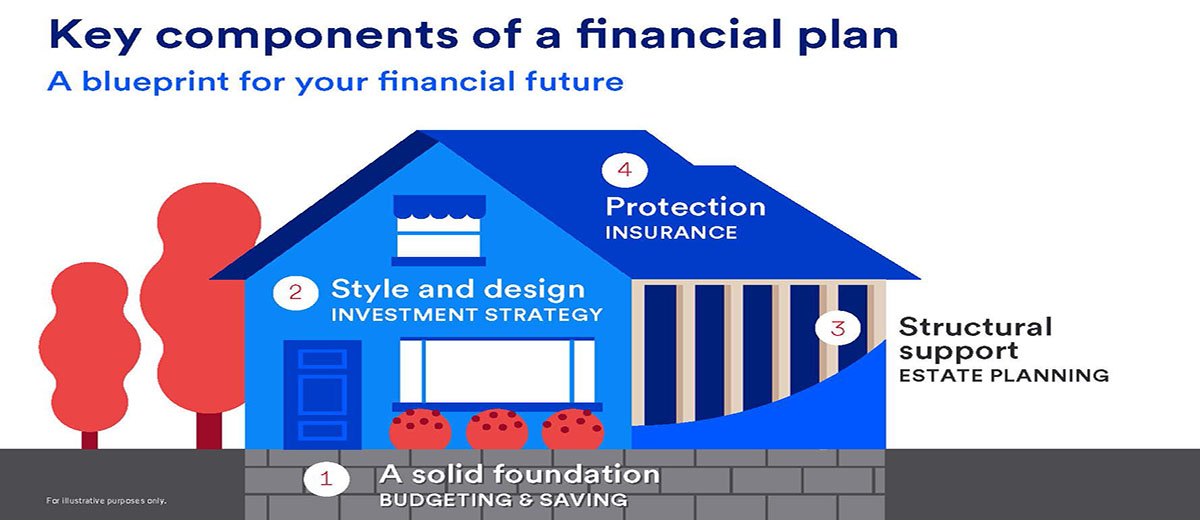
Estate planning documents: Living trusts vs. will vs. living will

How to start investing: A beginner’s guide


As you build your personal wealth, the routine choices you make can affect your success in the long term. Having a written financial plan can help you set goals for yourself and your family and ensure you’re in control of your money.
Think of the planning process like building a home: Each part of the plan, like a room in a house, is designed for comfort, protection and stability. The process will result in a blueprint for positive financial decisions, no matter where you are in life.
A financial plan is like a blueprint for your future. It aims to:
A comprehensive plan takes all aspects of your financial life into consideration. That includes things like budgeting, retirement, tax, estate, investments, and insurance, just to name a few.
Financial planning requires ongoing conversations and should evolve as you age and your life changes. You may not define all your goals at once and they’re also likely to change over time. But the important part is to start the planning conversations early and determine the direction you want to go.

A house needs a solid foundation, and so does your financial plan. In this case, budgeting and saving are the critical factors. You can’t build wealth without having a handle on your expenses and knowing what you can save.
If you don’t already, start tracking and categorizing your monthly income and expenses. Adjust your spending as needed and plan how to pay down high-interest debt, such as credit cards. Use what’s left over to build your emergency fund for added stability. Once you have enough saved to cover three to six months of household expenses, you can start working toward additional goals.
Your W-4 can also be a useful tool as you consider your savings opportunities. Review your HR resources to potentially reconsider how taxes are withheld from your paycheck. Increasing or decreasing your withholding can have an impact on your 1040 tax returns.
You’ll want to revisit your budget if you have significant life changes, such as a career change, marriage or divorce, and as you’re nearing retirement.
Read more on budgeting and saving:
What’s in your emergency fund?
Homes are modeled with specific functions, styles and floor plans in mind. Similarly, your investment strategy should be designed based on your personal goals, time frame and risk tolerance. While you don’t need a financial plan to start investing, a comprehensive financial plan will almost certainly include an investment strategy.
Having clearly defined goals will also help you determine how to invest and the amount of risk you’re willing to take. From there, you can frame and build out your investments to meet your needs. Investing is not a one-size-fits-all activity, so the result will look different for everyone and will change over time as your assets grow.
There are almost as many ways to invest as there are investments, so where do you begin? Depending on your goals, your options may include various savings accounts and retirement accounts, such as 401(k)s and individual retirement accounts (IRAs). These accounts form the foundation for your retirement savings. From this point, you can add other accounts to fit your goals.
Be sure to also take advantage of non-retirement accounts, such as 529 education savings plans, health savings accounts (HSAs) and brokerage accounts. Contributions to your HSA are taken out pre-tax and can be invested. Any gains are tax-free as long as they’re used for medical expenses. Once you reach retirement age, unused HSA funds can be taken as retirement income. And as long as your use the assets in your 529 accounts for education expenses, they are a tax-advantaged investment option.
Read more on investing:
Saving vs. investing: What’s the difference?
How to start investing: A beginner's guide
In a well-built house, beams and walls provide stability and support. An estate plan gives your financial plan structure, provides direction on how your assets should be managed and distributed and can help you pass on a family legacy to your loved ones. You can designate beneficiaries so that you have control over how your assets will be distributed in case of an adverse life event.
Work with an attorney to set up important documents, such as a will, trust, and financial and healthcare powers of attorney. Review your estate plan regularly and update it as necessary, especially after significant life changes.
Read more on estate planning:
Why estate planning is important
As you work toward building your wealth, you also need to think about how to protect it. Just as a roof shields your belongings, insurance can help reduce risk and protect your assets. While it may be an expense, insurance provides long term value and protection for your wealth.
You may consider different types of insurance plans, such as home insurance, life insurance and health insurance. As your needs and the needs of your loved ones change, review and update your coverage.
Read more on insurance:
Annual insurance review checklist
Building your personal wealth is an ongoing process, but a financial plan can help you remain on track as you work toward your goals. The sooner you start financial planning, the better, because the benefits of starting early will have a significant impact later. Remember:
Just as you build a home to keep your family safe and healthy, you should use the key components of financial planning to help you make stronger financial decisions both now and in the future.
When it comes to creating a financial plan, you don’t have to go it alone. Learn about our approach to financial planning.
Related content


